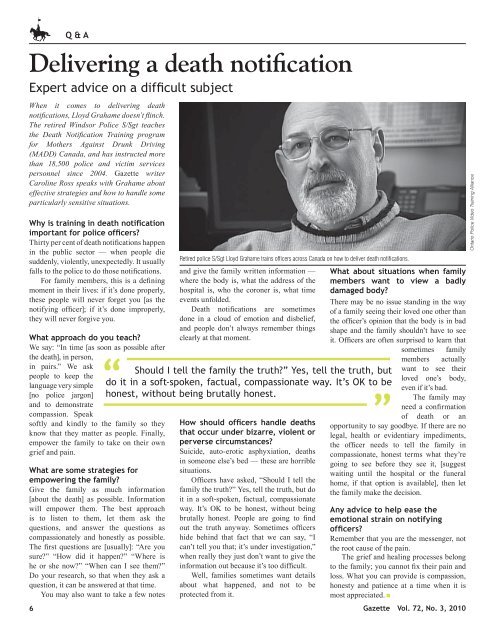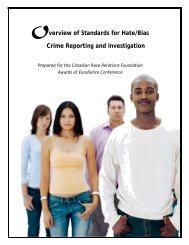RCMP Gazette Human Rights and Policing - Alberta Hate Crimes ...
RCMP Gazette Human Rights and Policing - Alberta Hate Crimes ...
RCMP Gazette Human Rights and Policing - Alberta Hate Crimes ...
You also want an ePaper? Increase the reach of your titles
YUMPU automatically turns print PDFs into web optimized ePapers that Google loves.
6Q & ADelivering a death notificationExpert advice on a difficult subjectWhen it comes to delivering deathnotifications, Lloyd Grahame doesn’t flinch.The retired Windsor Police S/Sgt teachesthe Death Notification Training programfor Mothers Against Drunk Driving(MADD) Canada, <strong>and</strong> has instructed morethan 18,500 police <strong>and</strong> victim servicespersonnel since 2004. <strong>Gazette</strong> writerCaroline Ross speaks with Grahame abouteffective strategies <strong>and</strong> how to h<strong>and</strong>le someparticularly sensitive situations.Why is training in death notificationimportant for police officers?Thirty per cent of death notifications happenin the public sector — when people diesuddenly, violently, unexpectedly. It usuallyfalls to the police to do those notifications.For family members, this is a definingmoment in their lives: if it’s done properly,these people will never forget you [as thenotifying officer]; if it’s done improperly,they will never forgive you.What approach do you teach?We say: “In time [as soon as possible afterthe death], in person,in pairs.” We askpeople to keep thelanguage very simple[no police jargon]<strong>and</strong> to demonstratecompassion. Speaksoftly <strong>and</strong> kindly to the family so theyknow that they matter as people. Finally,empower the family to take on their owngrief <strong>and</strong> pain.What are some strategies forempowering the family?Give the family as much information[about the death] as possible. Informationwill empower them. The best approachis to listen to them, let them ask thequestions, <strong>and</strong> answer the questions ascompassionately <strong>and</strong> honestly as possible.The first questions are [usually]: “Are yousure?” “How did it happen?” “Where ishe or she now?” “When can I see them?”Do your research, so that when they ask aquestion, it can be answered at that time.You may also want to take a few notesRetired police S/Sgt Lloyd Grahame trains officers across Canada on how to deliver death notifications.<strong>and</strong> give the family written information —where the body is, what the address of thehospital is, who the coroner is, what timeevents unfolded.Death notifications are sometimesdone in a cloud of emotion <strong>and</strong> disbelief,<strong>and</strong> people don’t always remember thingsclearly at that moment.“Should I tell the family the truth?” Yes, tell the truth, butdo it in a soft-spoken, factual, compassionate way. It’s OK to behonest, without being brutally honest.how should officers h<strong>and</strong>le deathsthat occur under bizarre, violent orperverse circumstances?Suicide, auto-erotic asphyxiation, deathsin someone else’s bed — these are horriblesituations.Officers have asked, “Should I tell thefamily the truth?” Yes, tell the truth, but doit in a soft-spoken, factual, compassionateway. It’s OK to be honest, without beingbrutally honest. People are going to findout the truth anyway. Sometimes officershide behind that fact that we can say, “Ican’t tell you that; it’s under investigation,”when really they just don’t want to give theinformation out because it’s too difficult.Well, families sometimes want detailsabout what happened, <strong>and</strong> not to beprotected from it.What about situations when familymembers want to view a badlydamaged body?There may be no issue st<strong>and</strong>ing in the wayof a family seeing their loved one other thanthe officer’s opinion that the body is in badshape <strong>and</strong> the family shouldn’t have to seeit. Officers are often surprised to learn thatsometimes familymembers actuallywant to see theirloved one’s body,even if it’s bad.The family mayneed a confirmationof death or anopportunity to say goodbye. If there are nolegal, health or evidentiary impediments,the officer needs to tell the family incompassionate, honest terms what they’regoing to see before they see it, [suggestwaiting until the hospital or the funeralhome, if that option is available], then letthe family make the decision.“Any advice to help ease theemotional strain on notifyingofficers?Remember that you are the messenger, notthe root cause of the pain.The grief <strong>and</strong> healing processes belongto the family; you cannot fix their pain <strong>and</strong>loss. What you can provide is compassion,honesty <strong>and</strong> patience at a time when it ismost appreciated. ▪<strong>Gazette</strong> Vol. 72, No. 3, 2010Ontario Police Video Training Alliance







